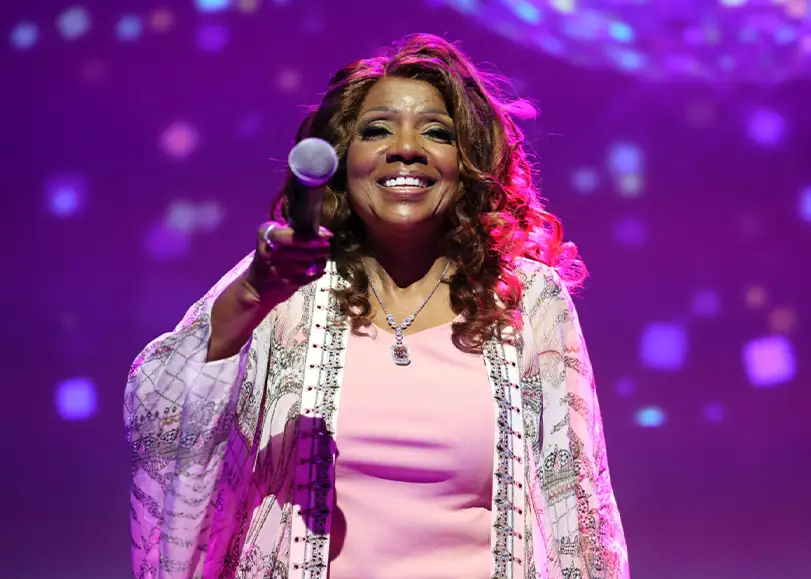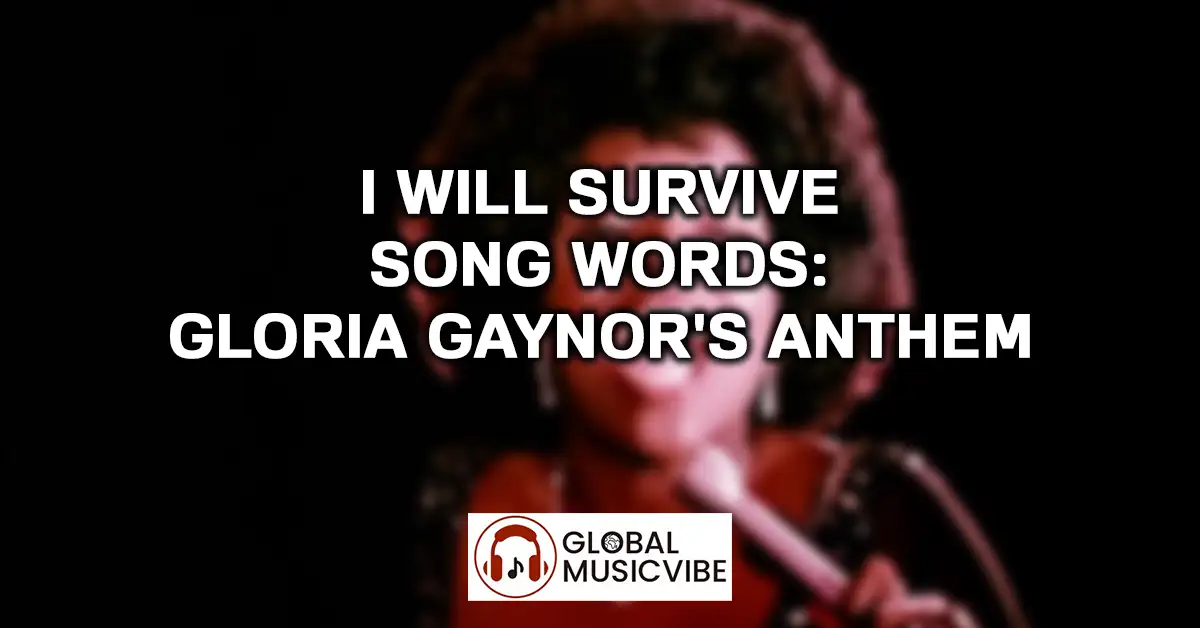The “I Will Survive” song words have resonated with millions of listeners worldwide since Gloria Gaynor first recorded this iconic disco anthem in 1978. Originally released as a B-side to “Substitute,” this empowering track became one of the most recognizable songs in popular music history. The powerful message embedded within these lyrics has transcended generations, making it a timeless declaration of resilience and personal strength.
The Origins and Creation of the Iconic Lyrics
The “I Will Survive” song words were penned by songwriting duo Freddie Perren and Dino Fekaris, with Fekaris providing the majority of the lyrics. The inspiration behind these memorable words came from a deeply personal place. According to Fekaris, the song’s genesis came from his experience of being fired by Motown Records after seven years as a staff writer. During this challenging period of unemployment, he found himself contemplating his uncertain future when something remarkable happened.
While watching television in his room, Fekaris heard a theme song he had written playing on screen, which he took as an omen that things would work out for him. This moment of hope inspired him to jump up and down on his bed, declaring “I’m going to make it. I’m going to be a songwriter. I will survive!” These words would later become the foundation of one of music’s most enduring anthems.
The Songwriting Partnership Behind the Words
Freddie Perren, who had previously been part of Motown’s The Corporation and co-wrote classics like “I Want You Back” and “ABC” by The Jackson 5, brought his production expertise to the project. The collaboration between Perren and Fekaris had already proven successful with hits like “Reunited” by Peaches & Herb, making them a formidable creative team in the disco era.
The Journey from B-Side to Chart-Topping Success
When Polydor Records initially released the song in late 1978, “I Will Survive” was positioned as the B-side to “Substitute,” a cover of a Righteous Brothers song that the label considered more “radio friendly”. However, the powerful message within the “I Will Survive” song words would not be contained to the flip side of a record.
The transformation began when Studio 54’s DJ Richie Kaczor took notice of “I Will Survive” and began playing it at the famous club. The response was immediate and overwhelming. The song entered the Billboard Hot 100 at a modest number 87 on December 16, 1978, but gained momentum over the Christmas and New Year period, hitting the Top 10 in early February 1979.
By March 10, 1979, “I Will Survive” had unseated Rod Stewart’s “Do You Think I’m Sexy” to spend two weeks at number one on the Billboard Hot 100. The song’s success wasn’t limited to America – it also topped the British charts for four weeks, establishing Gloria Gaynor as an international star.
The Cultural Impact and Meaning Behind the Words
The “I Will Survive” song words have become far more than just a breakup anthem. The disco genre found in “I Will Survive” an anthem that reflected one of its central themes: providing a voice to those whose voices were often silenced. The lyrics speak to universal themes of overcoming adversity, finding inner strength, and refusing to be defeated by life’s challenges.
Empowerment Across Communities
Women have heard in the song a model of independence and strength, and the belief that their identity is not solely defined by their relationships with men. The disco era was revolutionary in allowing women to dance independently, and these lyrics provided the perfect soundtrack for this newfound liberation.
The LGBT community, in particular, has embraced the song as an anthem of empowerment. Musicologist Nadine Hubbs noted that people in the LGBT community identify with “I Will Survive” because the “textual message of defiant and enduring presence was already well-tailored to queer identification needs, but this message and the song’s titular statement took on even deeper meaning with the dawn of the AIDS epidemic in the 1980s”.
Gloria Gaynor’s Personal Connection to the Lyrics

For Gloria Gaynor herself, the “I Will Survive” song words held profound personal significance. Just before recording the song, Gaynor had spent six months in the hospital recovering from a back injury, and the song served as her own source of motivation to survive and overcome the injury. She was actually wearing a back brace when she recorded the vocals, adding an extra layer of authenticity to her powerful performance.
Gaynor has expressed her appreciation for the song’s empowering effect, stating: “I love the empowering effect, I love the encouraging effect. It’s a timeless lyric that addresses a timeless concern”. This personal connection to the material is evident in every note of her iconic performance.
Musical Production and Vocal Performance
The power of the “I Will Survive” song words is amplified by the exceptional musical arrangement and Gaynor’s unforgettable vocal performance. Unlike many disco hits of the time, “I Will Survive” was recorded without any background singers, allowing Gaynor’s voice to stand alone in its defiant declaration.
Producer Freddie Perren had Gaynor record several takes of the vocals, then “double tracked” them by syncing up and mixing two different takes together, giving her vocals more punch. Gaynor also recorded the song at a higher vocal register than she normally sang, and the track wasn’t overproduced like her earlier hits.
The musical arrangement perfectly complements the emotional journey of the lyrics. The song begins with uncertainty reflected in a wandering, unresolved guitar line and rustling percussion, while orchestrated strings linger in the background. As the song progresses, the transformation into unflinching defiance is evident in both Gaynor’s vocal delivery, which goes from being airy and worn to controlled and stern, and in the instrumental arrangement itself.
Awards and Recognition
The impact of the “I Will Survive” song words has been recognized by the music industry and cultural institutions alike. Gloria Gaynor won the Grammy Award for Best Disco Recording at the 22nd Annual Grammy Awards in 1980, and also received nominations for Record of the Year and Best Female Pop Vocal Performance. Remarkably, this was the first and only time the Grammys offered the Best Disco Recording category, which was eliminated after the decline of disco in the US.
In October 2000, VH-1’s “100 Greatest Dance Songs” gave Gloria Gaynor’s anthem the number one slot. In 2015, the song was added to the National Recording Registry by the Library of Congress, recognizing its cultural and historical significance.
Covers and Interpretations Throughout the Decades
The enduring appeal of the “I Will Survive” song words is evident in the countless cover versions that have emerged over the decades. Since its release in the 1970s, “I Will Survive” has re-surfaced on the Hot 100 chart every decade in a variety of forms.
Notable covers include performances by legendary artists such as Diana Ross, Aretha Franklin, and Gladys Knight. The rock band Cake created a notable gender-reversed version in 1996, though Gloria Gaynor expressed disapproval of their use of profanity in the lyrics. In the 1980s, R&B singer Safire released her version that peaked at number 53 in 1989, while singer Chantay Savage’s jazzy ballad reached number 23 on the Hot 100 in 1996.
Global Reach and Translation
The universal appeal of the “I Will Survive” song words is demonstrated by the fact that the song has been translated into 20 different languages worldwide, including Arabic. This global reach speaks to the song’s ability to transcend cultural and linguistic barriers, delivering its message of empowerment to diverse audiences around the world.
The song’s popularity as a karaoke selection further demonstrates its widespread appeal. Whether you’re looking for the perfect earbuds for practicing your performance or need professional headphones for recording your own version, “I Will Survive” remains one of the most requested songs for performers worldwide.
Modern Relevance and Continued Impact
Nearly five decades after its release, the “I Will Survive” song words continue to inspire new generations. Gloria Gaynor herself has noted the song’s cross-generational appeal, saying in a 2012 interview: “It feels great to have such a song like that because I get kids five and six years old telling me they like the song, and then people seventy-five and eighty. It’s quite an honor”.
The song experienced a revival in 2015 when it was featured at the end of the film “The Martian,” demonstrating its continued relevance in contemporary culture. The lyrics’ message of survival against impossible odds perfectly matched the film’s themes, introducing the song to yet another generation of listeners.
Social Media and Digital Age Impact
In today’s digital landscape, the “I Will Survive” song words have found new life on social media platforms, where users share personal stories of triumph and resilience accompanied by Gaynor’s empowering anthem. The song has become a soundtrack for overcoming everything from personal setbacks to global challenges, proving that its message remains as relevant today as it was in 1978.
The Technical Excellence Behind the Words
The arrangement and production of “I Will Survive” perfectly serve the emotional arc of the lyrics. The track features a fantastic percussive and bass groove, with drums played by James Gadson and percussion by Paulinho Da Costa. The conga part especially adds to the danceable groove that these elements create together, providing the perfect foundation for Gaynor’s powerful vocal delivery.
The song’s structure takes listeners on an emotional journey that mirrors the narrative within the lyrics. Starting with vulnerability and uncertainty, the arrangement builds to a triumphant declaration of independence and strength. This musical storytelling has become a template for empowerment anthems that followed.
Frequently Asked Questions
Who wrote the original “I Will Survive” song words?
The “I Will Survive” song words were written by Freddie Perren and Dino Fekaris, with Fekaris contributing the majority of the lyrics. The song was inspired by Fekaris’s personal experience of being fired from Motown Records and his determination to succeed as a songwriter.
What was the original inspiration behind the “I Will Survive” lyrics?
The lyrics were inspired by Dino Fekaris’s experience of unemployment after being let go from Motown Records. During this difficult period, he saw one of his songs on television and took it as a sign that he would survive and succeed, leading to the famous declaration that became the song’s title.
Why did “I Will Survive” become popular despite being a B-side?
Although initially released as a B-side to “Substitute,” “I Will Survive” gained popularity when Studio 54’s DJ Richie Kaczor began playing it at the famous club. The powerful message and infectious groove resonated with audiences, leading radio stations to flip the record and play the B-side instead.
What makes the “I Will Survive” song words so universally appealing?
The lyrics speak to universal themes of resilience, personal strength, and overcoming adversity. The song’s message of survival and empowerment resonates with people facing various challenges, from relationship breakups to major life obstacles, making it relevant across different cultures and generations.
How many artists have covered “I Will Survive” over the years?
Dozens of artists have covered “I Will Survive,” including Diana Ross, Aretha Franklin, Gladys Knight, Cake, and Chantay Savage. The song has appeared on the charts in every decade since its release, demonstrating its enduring appeal and adaptability to different musical styles.
What awards did “I Will Survive” win?
“I Will Survive” won the Grammy Award for Best Disco Recording in 1980, which was the first and only year this category was offered. The song also received nominations for Record of the Year and Best Female Pop Vocal Performance, and was later inducted into the National Recording Registry.

